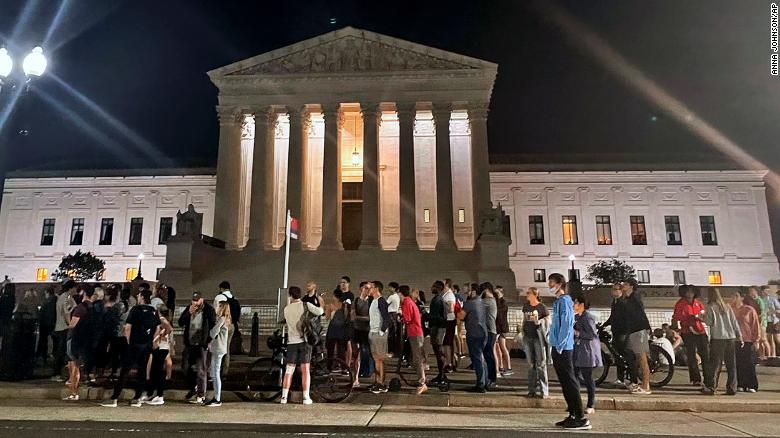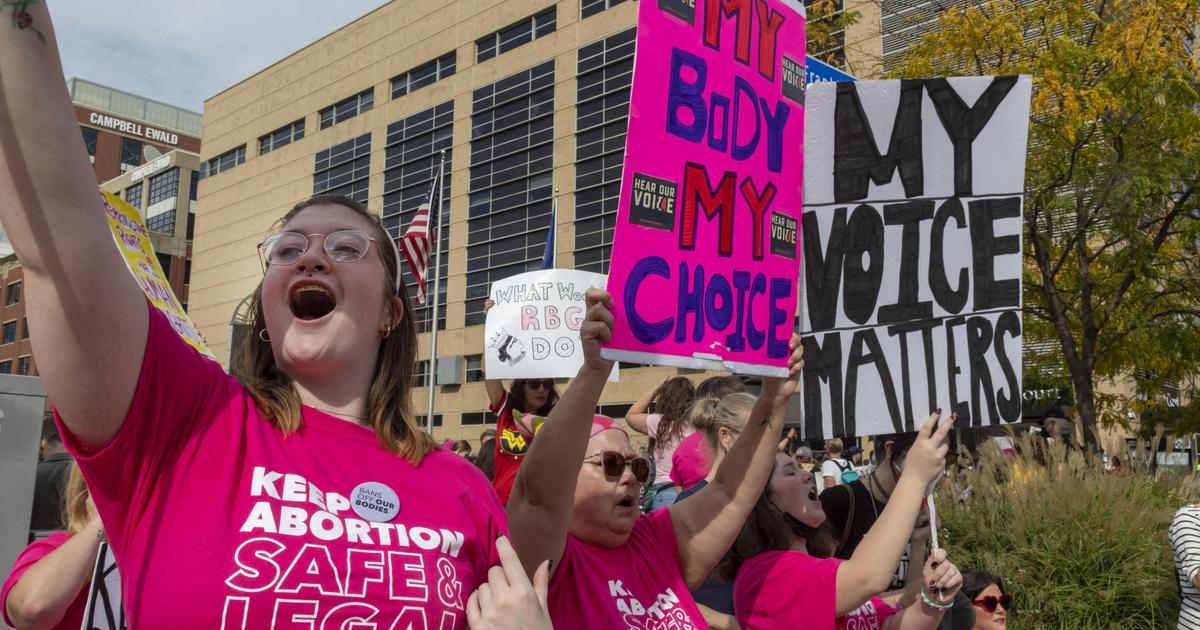Several states will protect access to abortion despite the Court's ruling 1:31
(CNN) ––
The United States Supreme Court made a decision on Friday that will transform the landscape of women's reproductive health: annul the ruling of Roe v.
Wade who decriminalized abortion.
The judgment of Roe vs.
Wade, in 1973, had upheld the right to receive an abortion under the 14th Amendment, ruling that abortions are constitutionally protected until approximately the 23rd week, when a fetus can normally live outside the womb.
Last year, the Supreme Court agreed to review an objection to Mississippi's law banning abortions after 15 weeks.
Precisely, a case that paved the way for the high court to examine decades of precedent established by Roe v.
Wade.
Some state legislatures have enacted policies to increase access to abortion.
For example, California passed a law in March to eliminate additional costs for abortion services that health plans cover.
And in Colorado, Democratic lawmakers codified the state's right to receive an abortion.
States that have limited access to abortion
However, many Republican-led state legislatures have already taken steps to limit abortion access.
Meanwhile, others are preparing to implement restrictive laws that have not been enforced since Roe was passed.
In total, according to an analysis by the Guttmacher Institute, 23 states have laws that limit access to abortion, including several with multiple provisions.
States like Michigan, Wisconsin, and West Virginia had restrictions on abortion before Roe v.
Wade that was never removed.
Others have passed near total bans or laws criminalizing abortion after a certain number of weeks.
But the courts blocked many of these measures, including those in Alabama, Georgia, Iowa, Ohio and South Carolina.
advertising
Supreme Court would overturn Roe v.
Wade according to leak to Politico 7:02
Lawmakers in 13 states have passed ineffective laws banning abortion, but designed to take effect if Roe v.
Wade, as indeed it happened.
These are the states with those kinds of laws ready to go into effect almost immediately.
Arkansas
Arkansas has a law on record that would ban nearly all abortions upon court reversal, except in the case of a life-threatening medical emergency.
A health professional who breaks the law could face up to 10 years in prison, a fine of up to $100,000, or both.
5 keys to Roe vs.
Wade, the case that decriminalized abortion in the US
Last year, a federal judge blocked another bill ––already passed into state legislation–– that seeks to ban almost all abortions and makes no exceptions for rape or incest.
Idaho
In Idaho, the law that would go into effect makes providing abortions a felony punishable by up to five years in prison.
The measure includes exceptions to avoid the death of the pregnant person or in case of rape or incest.
The Supreme Court would nullify the right to abortion in the US 0:54
In March, Idaho lawmakers passed another regulation modeled on Texas' restrictive abortion law, which bans the procedure once some fetal heart activity can be detected.
Which can happen as early as six weeks.
The law also allows family members of the fetus to sue the medical provider who terminated the pregnancy.
The state Supreme Court blocked this ban after abortion providers challenged the law in a lawsuit.
Kentucky
What is Roe vs.
Wade?
What you should know about the ruling that decriminalized abortion in the United States
The Kentucky legislature passed a bill in 2019 that would ban abortions and make performing them a felony.
Very limited exceptions would be considered to prevent death or serious injury to the pregnant person.
louisiana
Louisiana has a law that would prohibit medical providers from performing an abortion procedure or providing medication that induces it.
The ban would be lifted in the case of serious or life-threatening medical emergencies.
But it requires that the health professional make "medically reasonable efforts" to preserve the life of the adult and the fetus.
mississippi
Mississippi law provides that within 10 days after the state Attorney General confirms that Roe v.
Wade was overturned, abortions are prohibited in the state.
Limited exceptions are considered in cases of rape or when the procedure preserves the life of the mother.
Mississippi passed another abortion ban after 15 weeks in 2018, which is the source of the case that went to the Supreme Court.
Missouri
Missouri passed a law in 2019 that would make it criminal for medical providers to perform or induce an abortion, except in cases of medical emergencies.
North Dakota
In these countries abortion is legal (and in these others it is not allowed under any circumstances)
A law passed by the North Dakota legislature in 2007 would ban abortion and make the procedure a crime, except in cases where the life of the mother is saved.
The law would enter into force "as a result of new decisions of the Supreme Court of the United States."
Oklahoma
Oklahoma Gov. Kevin Stitt signed a bill in April that makes abortions illegal in the state and only allows exceptions to save the life of the pregnant person.
The measure also makes performing or attempting an abortion a crime with a maximum fine of $100,000 or a maximum of 10 years in state prison, or both.
A second bill that was enacted establishes a timetable for the provisions to come into force depending on the decision of the Supreme Court.
South Dakota
South Dakota has had a ban ready to go into effect since 2005, when a law was passed that absolutely criminalizes nearly all abortions should Roe v.
Wade.
The law would make it illegal to perform a voluntary termination of pregnancy, except in life-threatening medical emergencies.
It would take effect "on the date the United States Supreme Court recognizes the authority of states to ban abortion at all stages of pregnancy."
Tennessee
The Tennessee law contains a provision that would prohibit all abortions except those that would prevent the death of the mother and would take effect 30 days after Roe v.
Wade.
Medical providers could be charged with a felony for breaking the law.
Texas
The Texas law was enacted in June 2021 and would make abortions illegal, unless the pregnant person's life is in danger or they are at risk of serious injury.
The law would take effect 30 days after the Supreme Court ruling on Roe v.
Wade.
Utah
Utah passed a law in May 2020 that bans almost all abortions if Roe v.
Wade.
Exceptions include cases of rape or incest, detection of serious birth defects, or prevention of death or serious injury to the pregnant person.
Performing an abortion in violation of the law would be considered a felony.
Wyoming
Signed into law in April, the Wyoming bill added a provision that would make it illegal to perform an abortion if Roe is struck down, with extremely narrow exceptions for cases of sexual assault, incest, or risk of death or serious injury to the person giving birth. light.
Editor's Note: This article was originally published in May 2022 and updated with the Supreme Court's decision on June 24, 2022.
CNN's Tierney Sneed, Ariane de Vogue, Joan Biskupic, Veronica Stracqualursi, Shawna Mizelle, Paradise Afshar, Caroline Kelly and Rebekah Reiss all contributed to this report.
AbortionSupreme CourtDecriminalization of abortionInstaNews




/cloudfront-eu-central-1.images.arcpublishing.com/prisa/3F3EHAP7NYDCD7NIOIZLOQJFPI.jpg)




